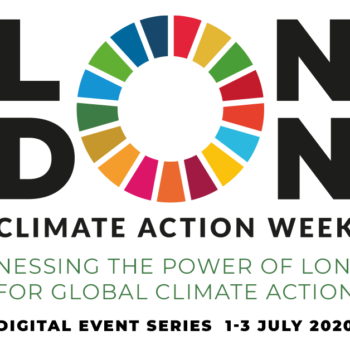The first London Climate Action Week (LCAW) in 2019 was a huge success with over 160 events; making it the largest climate event in Europe outside official UN meetings.
The digital version of LCAW this week has attracted over 70 events. From discussions with stakeholders the full LCAW in November 2020 will show a step change in growth again.
The quality of LCAW events demonstrates the scope and depth of climate change expertise in London, and the audiences reveal the global reach of London-based organisations. But while providing a platform for announcements, debate and mobilisation was always a core aim of LCAW it was never meant to be the end point.
The challenge of deepening climate action through the global COVID-19 crisis has made this even more necessary. Climate action will only move forward in the next decade if it is integrated into COVID-19 recovery plans and drives the reforms needed to make countries more resilient. The most important of these decisions will not be made by environment ministries or at UN climate summits, but by economic ministries, the IMF and the G20.
With debt growing and large-scale unemployment, climate action will have to find an economic rationale that works alongside demands for increased health and social spending.
Climate actors will need to impact decisions in unfamiliar venues and build new coalitions with actors working on health, economic resilience and economic development if action on the climate crisis is going to avoid being squeezed out by immediate pressures.
Put another way, climate change is going to have to do a decade of mainstreaming in 18 months if there is to be any chance of keeping global temperatures well-below 2°C; let alone 1.5°C.
As the largest concentration of climate-active organisations in the world, London has the responsibility and capability to help lead responses to the new context in three ways:
Designing deliverable green recovery solutions
The case for a green, fair and resilient recovery has been made eloquently by thought leaders, Prime Ministers and the UN Secretary General. Similar promises were made in 2009 but only 12% of the global stimulus supported climate action.
The economic case for clean investment is much stronger today, but this it’s not enough. Decision makers are asking for deliverable green recovery solutions which will make an economic impact in the next two years. Bringing together its world leading technical, business, financial and policy expertise, the London climate cluster must provide the solutions the world needs.
Creating whole economy solutions
Green recovery packages after the last financial crisis focused on renewable energy and efficiency retrofits; action in the aftermath of COVID-19 needs to integrate across the whole economy. Increased investment in electric vehicles and heating requires digital and infrastructure upgrades to energy networks. Optimising resilience investments requires action across flood defence to nature-based infrastructure and urban cooling solutions. Shifting transport needs after COVID-19 requires integrated urban and transport system renewal.
The range of expertise in London should facilitate integrated solutions and innovation to tackle these problems; not least by using London itself as a test bed for cutting-edge approaches.
Reaching beyond climate
Competition for government funding and attention will be huge as societies recover from the first COVID-19 wave and adapt to the new normal. Climate action should not look to compete with other urgent priorities but instead find areas of complementary investment with health, social care and inclusion in areas such as reducing air pollution, increasing access to green space, improving heating and cooling access, strengthening disaster resilience and enhancing food security.
Climate actors must make a virtue of their ability to leverage private finance and green taxation systems to allow fiscal space for other public-spending priorities. London’s diversity and unique range of world class sectors means integration can be delivered for the price of a tube ride; even in an age of Zoom the benefits of proximity matter for innovation and integration.
LCAW digital will give a taste of how London is beginning to respond to COVID-19 through its leading work on sustainable finance, broad-based resilience and new forms of cooperation. But the real measure of London’s response will come after LCAW in how new collaborations are sustained and strengthened; how innovative solutions are developed and moved into concrete action.
Watch CEO Nick Mabey speak about London Climate Action Week here.
London Climate Action Week in November
As an outcome of LCAW digital we will be asking stakeholders how best to support deepening collaboration inside the London climate cluster over the coming months; including by growing its global engagement and impact.
This could take the form of cooperative platforms for innovation and campaigns; perhaps linked to the UK and Italian G7, G20 and COP 26 Presidency agendas in 2021. We need to learn the lessons of delivering virtual global engagement from LCAW digital and use them to improve access to London-based debates and capacity.
We must develop new ways of working with London’s government and communities to shape the city’s own COVID-19 recovery to ensure it is green, inclusive and resilient. This must include ensuring that the climate community creates more opportunities for all Londoners to have a voice and promotes equal access to growing green employment opportunities. As London’s Mayor Sadiq Khan said in support of LCAW,
“The climate emergency remains one of the biggest threats we face. As we recover from Covid-19, we can’t replace one health emergency with another – we need to come out of this crisis embracing a new normal which puts tackling the climate emergency at the heart of everything we do.”
London Climate Action Week in November 2020 will be a chance to take stock of London’s progress towards these goals; as well as being a platform for relaunching the momentum of climate action towards COP 26 in 2021. We look forward to welcoming a global audience – both virtual and physical – to be involved in this journey and to help ensure London plays it full role in driving the global climate transition.
We are grateful for the support of The Bulb Foundation and Children’s Investment Fund Foundation (CIFF) for LCAW2020.


